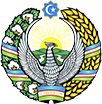

- Elektron kutubxona
- E-universitet
- Masofaviy ta'lim
- Mashg‘ulotlar jadvali
- Xorijiy talabalarga
- Stipendiya va grantlar
- Talabalarga xizmat ko'rsatish markazi
- Street Law
- Akademik mobillik
- Xorijiy professorlar
- Treninglar va mayner kurslar
- Klub va to‘garaklar, mahorat darslari va festivallar
- Murojat qilish
- Korruptsiyaga qarshi kurash usullari
- Ta’lim grantlari
- Toshkent davlat yuridik universitetida kiyinish tartibi
Talabalar uchun
TSUL as a Hub for Public Skills Development: Executive Learning & Vocational Training
Executive and Vocational Education for the General Public
Tashkent State University of Law (TSUL) is committed to advancing the United Nations Sustainable Development Goal 4 (Quality Education) by providing accessible and high-quality learning opportunities for all. In alignment with SDG 4.3.3, the university hosts a wide range of educational events, executive education programmes, and vocational training courses that are open to the general public. These initiatives are designed to promote lifelong learning, enhance professional skills, and contribute to the legal literacy and cultural development of society. By extending its educational resources beyond enrolled students, TSUL fosters an environment of continuous personal and professional growth for all citizens.
Publicly Accessible Educational Programmes
TSUL offers several key educational programmes designed to be accessible to the general public, providing valuable knowledge and skills in various legal and professional fields.
This online platform provides a variety of courses open to the public, aimed at increasing legal literacy across different segments of society. The courses are designed to be practical and relevant, covering essential topics and providing certification upon completion. Key courses include:
o Environmental Law: This 6-lesson course explains the rights defined by legislation in the field of ecology, concluding with a final test and certificate.
o Gender Equality: Developed in cooperation with the USAID Legal Reform Program, this course focuses on ensuring equal rights and preventing harassment and violence.
o Reduced Inequalities: This 4-lesson course aims to increase the legal consciousness of citizens by explaining the rights of persons with disabilities, covering legal protection, labour rights, and tax benefits.
o Family Law: An 8-lesson comprehensive course covering marriage procedures, parental rights, property rights, and women’s rights related to pregnancy and childcare.
o Preserving Health: A 5-lesson course focused on healthcare rights, particularly for women during pregnancy, childbirth, and child care.
o Right to Education: This 4-lesson course explains citizens’ rights as defined in legal documents related to the education system.
o Citizenship and Migration Issues: A 5-lesson course explaining the rights defined in legislation on migrants, which includes a final test and a special certificate.
o Youth Rights: This 4-lesson course covers state policy on youth, the “Youth Register”, and related legal documents.
o Labour Law: A 5-lesson course designed to increase legal literacy regarding labour relations legislation.
o Starting a Business in Entrepreneurship: This course focuses on the legal aspects of regulating business activity.
Tashkent State University of Law (TSUL) hosts events and offers multiple short courses and training programmes that function as executive education and vocational training open to the general public (i.e., people not attending the university).
TSUL has established a dedicated centre, and offers specific platforms and programmes for specialized, non-degree training, demonstrating a commitment to lifelong learning and professional development for the wider community.
Centre for Professional Training of Lawyers by International Standards
This centre, operating under TSUL, is specifically established to provide professional training for lawyers and other individuals interested in legal expertise. This directly addresses the need for short, specialized vocational training.
Summer Course on International Commercial Arbitration
TSUL organizes this specialized short-term course focused on an advanced legal topic, which serves as a form of executive education for legal professionals and interested members of the public.
The Project “Targ’ibot poyezdi” (Propaganda Train)
While not a traditional course, this project involves outreach activities intended to promote legal knowledge, functioning as an educational event open to the general public, distinct from a standard academic curriculum.
Legal Retraining Courses
Admission Now Open for University Graduates
Required Documents
- Passport
- University diploma and transcript
- A 3.5x4.5 cm colour photo
Application Deadline: October 31
Apply Now at qabul.centertsul.uz
Note: The courses are conducted in person at our facilities.
Professional Development Courses
In the Centre, there are 288-hours courses of retraining and improvement qualification for pedagogical staff teaching in higher education institutions in law in “Jurisprudence” and “Legal science”, as well as 144-hours courses of improvement qualification for secondary-specialized teachers in law in “Lawyer”.
These courses aimed at continuously updating the professional skills, and abilities of pedagogical staff as well as improving the quality of training based on modern requirements.
Tashkent Mediation Centre
The Tashkent Mediation Centre, a non-governmental non-profit organization, was established under the auspices of the Tashkent State Law University and the Centre for Professional Development of Lawyers.
The new structure brings together professional mediators engaged in alternative dispute resolution in an organizational and methodological way. The center also trains professional mediators in mediation and alternative dispute resolution.
Now, citizens and entrepreneurs can apply to the mediation center to resolve their disputes. In addition, applicants will have the opportunity to find a solution to their disputes by choosing a mediator who is an expert on the issue raised.
Legal Clinic
Our goal: We strive to ensure the harmony of theoretical knowledge of university students with practice, develop students' practical skills, and provide impartial legal advice to individuals and legal entities.
Our Partners
· Association of Legal Clinics of Kyrgyzstan
· Eurasia Foundation
· United States Agency for International Development (USAID)
· Street Law Inc
· United Nations Office on Drugs and Crime (UNODC)
· United Nations Development Program (UNDP)
· New York University Syracuse
Statistics: The volunteer selection competition conducted by the Legal Clinic of Tashkent State University of Law has concluded. In 2025, about 800 students applied for internship at the Legal Clinic. Based on the selection results, 137 students were admitted as volunteers. For reference: in 2024, the clinic’s specialists and volunteers reviewed more than 3,000 appeals.
The students of the Legal Clinic, in collaboration with university teaching staff, actively organize various promotional events and on-site citizen receptions with the slogan, “Our priority is to enhance society’s legal awareness and culture.”
Students who are members of the Legal Clinic have the opportunity to:
· Work on real cases
· Engage in face-to-face consultations with citizens
· Draft legal statements, complaints, claims
· Acquire other important skills essential for a professional lawyer
Admission Information: The Legal Clinic accepts students from the 1st to 3rd years. Due to the growing interest in practical experience at the Legal Clinic, the selection process will include a qualifying round with special tasks. Those who pass tasks will be invited for an interview with the head of the Legal Clinic.
Learn more about the Legal Clinic
Video Library
Educational Materials
Manual: “Fundamentals of Clinical Legal Education”
Author: Otabek Narziev, Associate Professor of TSUL
This comprehensive textbook is designed for students involved in providing free legal assistance to citizens in a legal clinic. It focuses on developing essential skills for:
- Receiving and working with citizens at legal clinics
- Identifying legal problems in applications
- Providing effective legal advice
Intended Audience:
- Legal clinic students
- Clinic teachers
- Professionals working with citizens' appeals and legal advice
How to Access: The manual is available at the University’s Information and Resource Centre. For purchase inquiries, please contact the university directly.

